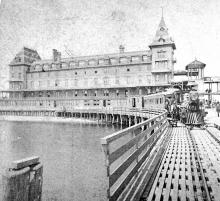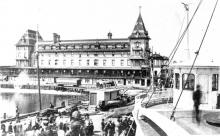[From Our Regular Correspondent.]
COTTAGE CITY, Sept. 26, 1892.
At 11.45 on Saturday night, watchman Lewis rung in the alarm from box 41, at the Arcade, and people jumped from their beds and rushes to the windows and saw, with dismay, the eastern sky brilliantly illuminated, directly over the Sea View House. Cries of “Fire!” “Fire!” “The Sea View House!” “The Sea View House!!” rent the stillness of the night, the light in the heavens contrasting vividly with the darkness, the sky being overcast with heavy clouds, from which at times the rain descended, as if weeping in sorrow over the awful catastrophe.
Soon the streets were alive with men, women, and children, who hurried to the scene and beheld the beautiful structure which, ever since its erection, twenty years ago, has been one of the centers of attraction to the summer visitor and our resident population; in fact of interest to those living in other towns on the Island – grandly illuminated from one end to the other. Only those arriving within a few minutes of the alarm were in time to see the building before the north end fell in, the flames being under full headway before the fire was seen.
The flames did their work rapidly about the centre of the building and soon the tall chimney, from which the woodwork had fallen, stood for a few seconds alone, like a sentinel looking down upon the awful destruction; then it was seen to tremble and topple over, then settle down, down, into the burning, seething mass below. Meanwhile the flames had taken full possession of the south tower, and as its windows, from top to bottom showed forth the awfulness of the demon within, no such magnificent sight was ever seen in this town. The fire now began to come through the roof in little jets and run along the fancy woodwork across the roof of the tower and about the balconies, which soon fell. The flames then burst forth and the whole tower, inside and out, was one grand mass of fireworks. Soon those watching saw that its foundations were burned out, and the roof fell with the rest into the flaming vortex beneath.
While this scene was transpiring the firemen were working with a will to save Casino, the Sea View Annex and the surrounding property. The Episcopal church was so hot that the water thrown upon it rose in columns of steam. It was almost impossible for the men to stand where they could put the streams on the Annex, and Mr. Sherman T. Meara's presence of mind is due to the fact that a temporary protection was raised of board shutters, which shielded the men from the heat of the flaming mass, behind those boards they were able to stand and keep the streams constantly playing on the Annex. Another company of firemen were trying to save the Casino, but could not reach the side toward the water on account of the intense heat caused by the burning wharf and buildings there on. The telegraph and ticket offices, and the covered walk and roof over the wharf were now one grand carnival flame. At this time the corner of the Casino, near the ticket office at the head of the wharf, took fire, and for a time it seemed as if no earthly power could save it; but the fire engineers worked on, ably supported by the faithful firemen, and the fire in the Casino was finally extinguished. The flames burned out the north end, and the arches and woodwork inside are black and charred. The iron roof remains, but what is left of the woodwork is only good for kindlings. The beautiful flags which adorned the interior of the rink are gone, and but two of the hundreds of Japanese lanterns which adorned the interior of this immense structure remain to tell the story of its former glory. Standing at the south end of the Sea View House a view of the whole scene was obtained, showing the burning mass of the famous hotel, the wharf, on fire its entire length with its roof and buildings, and on the north end the flaming Casino. It was a sight which will never be forgotten.
The origin of the fire is unknown. Various theories are afloat concerning it, but the whole matter is enveloped in mystery. Mr. W. A. Vanderhoop, who had just returned from the supper of the Four C's, saw the light in the direction of the Sea View, and after rousing the family, rushed to the wharf to secure what he might of valuable books and papers or freight that might be in the store house. The flames were under such headway and spread so rapidly that his return was cut off by way of the wharf, and he was obliged to jump overboard and swim ashore to save his life.
Mr. S. W. Ellsworth, the popular Old Colony ticket agent, was one of the first to arrive at the scene of disaster and had but time to save his account books and a few tickets before he had to leave the awful place, which before many minutes was a burning mass. The safe fell through the floor on the beach and was opened on Sunday, when it was found that its contents were uninjured. Mr. Henry L. Wimpenney's express safe, which was stored in the building on the wharf, to be put on board the boat Monday, fell to the bottom of the ocean under the wharf. The Sea View safe lies buried under the burning mass of debris.
Freeman R. Cottle, engineer at the gas works, rendered valuable aid on the steamer. Another person who rendered much assistance was Miss Georgie Cleaves who made another famous “John Gilpin” ride to the water works and notified the engineer, who soon had the engine at work pumping to keep up the supply of water in the water tower. Toward morning, Mrs. H. J. Greene made a large quantity of coffee and sent it, steaming hot, to the firemen and others at work. The Oakwood and Island houses also sent cans of hot coffee which were gratefully received; it is possible others may have don the same, but we have not been informed of their names. Another piece of enterprise was the appearance on the scene of J. N. Chamberlain with his camera, although rather late on account of delay in trying to save his property in the vicinity of the fire. Another matter of importance was the arrival of Telegraph Operator Neifert, from Vineyard Haven, with the telegraph instrument. The steamboat clerk, Mr. S. E. A. Ripley, got permission of Mr. J. N. Chamberlain to use his store, in the rear of the Sea View Annex, as a telegraph office, and in a very short time electric light man Nickerson climbed to the top of the telegraph pole and brought down a wire which was run in over the top of the window and soon connected with the instrument when the “click, click” of the instrument was sounded, and in a short time they were reading in Boston of the terrible disaster which had befallen us.
The Sea View was insured for about 40,000 dollars; the Casino, wharf and M. V. Railroad property were not insured. On Sunday evening we listened to an account by Capt. Hart's brother-in-law relating his first knowledge of the fire. He said: “I was sleeping here in the Annex, as was the rest of the family. I was suddenly aroused by a noise and listened and heard of sound as of small stones striking on the concrete. I listened again, but heard nothing, and rolled over to go asleep when I heard a snapping and crackling sound. I rushed to the window and saw the light in the Sea View. I called to my niece in the next room an told her the Sea View was on fire. She couldn't believe it, and I told her it was true. I then went to Capt. Hart's room and called him three times before I awaked him and his wife. We dressed as hurriedly as possible and went out.” Capt. Hart said Vanderhoop was the first man he met. There was no time to save anything. The best silver was in the safe, and the rest had been packed up the day before and was ready to pack away in the safe. It was interesting to listen to the accounts as told by individuals of their experiences in getting dressed: some couldn't find the matches, others tried to find their clothes but couldn't locate them, they were so turned around and excited. Ladies were out with their hair braided down their backs as they arose from their beds; many were hatless and others were barefooted. The night was warm; the wind, what there was of it, was blowing off shore, and that was favorable to keeping the fire within bounds. If the wind had been blowing toward the town there is little doubt but that the loss of property and perhaps life would have been great. There is much to be thankful for and to congratulate each other on.
On Sunday large numbers from the towns of Vineyard Haven and Edgartown visited the scene of disaster, and there was general mourning over the event. It is hoped that a larger hotel, that will be suited to winter use as a sanitarium, will soon be erected. It is possible that much good may come out of this great calamity.
It is rumored that a hotel will be built immediately on the high bluff – the site now occupied by the Casino.



 1 comment
1 comment





Comments (1)
Comments